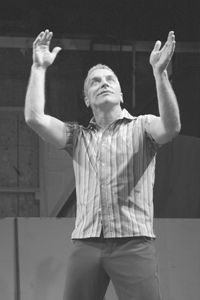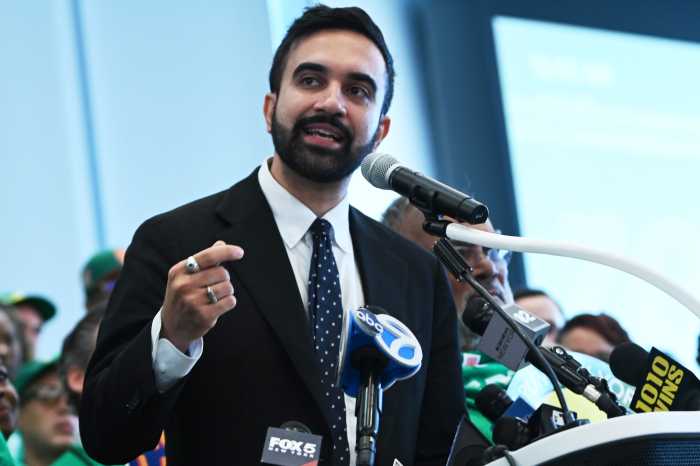Billy Bowers tells his affecting story from Big Sky to Deutschland
Mr. Goodbody has been laughing himself to death for as long as he can remember.
Just imagine being a five-year-old kid under Montana’s Big Sky who likes to play with Barbie dolls, landscaping the Barbie Parade routes with gladiolas. Does that with intensity until one day Mom, hanging out the laundry, sees what’s going on and switches him over to Tonka trucks. Some time later she enrolls him in a hunter’s safety class.
“This is Montana, everyone hunts, that’s what every boy should want to do,” said Bill Bowers, aka Mr. Slim Goodbody. “I hated every minute of hunter safety except the prospect of wearing the bright orange vest.”
Second grade. Granddad drives him through snow to school, in silence.
“He’s a big man of very few words and he scares me to death.”
Reaches the school. Stops the car.
“As I open the door to get out he hands me a silver dollar and says: ‘I don’t care how long your hair gets, just don’t ever squat when you pee.’”
Although Mr. Goodbody (no longer Mr. Goodbody, or The Seat Belt Man, or Captain Transit, or The Mechanical Man, or Bruce Spruce the Stand Up Comic Christmas Tree) had to carve out a place for himself as a mime, he is actually a man of a great many words. He’ll be saying many of them in “It Goes Without Saying,” the show that opens September 7 at the Rattlestick Playwrights’ Theater on Waverly Place.
He developed the memory piece working with director Martha Banta.
“Went to her,” he said, “because she doesn’t like mime.”
“Neither do I,” murmured an intrusive journalist
“Neither do I,” said Bill Bowers with a burst of laughter.
Sixth grade. “Lots of things happened in our neighborhood that were never, ever, discussed…”
One day, “two airplanes filled with smokejumpers crashed head-on over our house, and dead bodies rained down in parachutes. I remember I was washing dishes with my Mom. It wasn’t hearing the crash so much as a feeling. We went out to the driveway. My hands were still wet.
“It was like 9/11, only smaller. Illogical. Things falling out of the sky. Very disturbing. I was 11 or 12. And for years I thought I’d maybe made that up. But then a few years ago my brother-in-law, a photographer, showed me some pictures he’d made that day.”
Bowers, who was born on April 19, 1959 in Missoula, Montana, a town with a population of about 60.000, said of his hometown, “It’s a big city––by Montana standards, a metropolis. My mom saw the show two years ago in its premiere at the Berkshire Theater Festival.”
“She’s never said this was a strange career for me; her only concern is that I’m going to do it out there in Missoula, where the people – not theater folk, not city folk — will kill me.”
(Bowers’ father, a five –foot-tall farmer who was called Shorty, is dead.)
Growing up, one thing led to another. The kid wrote songs and sent them to Cass Elliot, designed cheerleader costumes, drew renderings of what a mall would look like if Missoula ever got one.
“I was the arbiter of good taste at 11 years old.”
And in junior high English class gets an A for a book report on mime from the teacher he calls Mr. G.
“He encourages me to join the drama club––which I like to think of as Gay Head Start.”
Time passes. Somebody makes passes. Somebody seduces somebody.
“Mr. G. tells me that I am special. That what we have is special. It’s just between us. I learn to be quiet. I learn to lie. And even if I could tell anyone, who would I tell? Oprah will not make it onto TV for another 12 years. There is no ‘Will and Grace.’ And I am 14. In 1972. In Butt Fuck, Montana.”
Quick cut to 2006.
“The import of all those things never came clear to me until I started working on this play. The importance of what is not spoken. Buried so deep that it’s taken the writing of this play to let it all surface.”
And Mr. G., “teacher, influence, the man who turned my life around”––is still a hero to Bowers’ family, also to Bill Bowers himself.
Bowers was “Captain Kangaroo’s” flesh-and-blood spin-off, Mr. Slim Goodbody for seven years, touring the schools, libraries, shopping malls, health fairs, cancer wards of 29 states in a spandex suit with anatomically painted bones and muscles and tendons and organs. It paid the rent.
It was when he finally got to Broadway––first in “The Scarlet Pimpernel,” then in “The Lion King”––that Bill Bowers began to find himself sitting around in dressing rooms telling stories to one and all ––these stories––between shows. Somebody said: “You ought to write this stuff down.” Somebody else steered him to Martha Banta. He and Banta went to work. “We actually left the writing-down to last.”
What does an actor do when not acting? He waits tables. It was as a waiter at Greg Dawson’s Ballroom, just off Eighth Avenue at 28th Street, that Bill Bowers fell in love with the most beautiful man he’d ever seen in his life, a young German, a maitre d’ with “these electric blue eyes.” His name was Michael Zibers.
On their second date, “I had some confessions to make… Michael had some confessions too. He was HIV-positive” and the caregiver “to his former partner, Joe, who had full-blown AIDS. This was 1987, and AIDS was running wild.”
Joe died within the year, “and no one in his family ever knew what he died of.”
Billy and Michael moved together to Manhattan’s East Village––an apartment that had once been Ronnie Gilbert’s, she of The Weavers––where Bowers has lived ever since “and which I will never leave.”
In June of 1992 Michael developed pneumonia. During his month-long hospital stay, he and Billy decided to visit Zibers’ roots in the little town of Guben in––though the Wall was now down––what had been East Germany.
“When we change planes in London, Michael needs a wheelchair…”
At Check Point Charley, Michael wets his pants…
“We clickety-clack across East Germany in an old wooden train. No one speaks any English and the countryside is frozen in time… I am thinking that when we get to Guben I have to find medical help…”
They get to Guben, where things at Tanta Eva’s house, full of “an army of blonde-haired, blue-eyed relatives,” go from bad to worse. Guben is still in 1945. Michael is irritable, disoriented.
“What none of us know is that Michael has a tumor on his brain, growing rapidly, and it will incapacitate him within days … With the help of an Etch-a-Sketch I borrow from one of the Nazi youth, I draw pictures of a hospital, a train station. I pantomime for the family that we must leave immediately and get Michael to Zurich…
“Michael is speaking exclusively German by now, and has taken to calling me Elvis … Tanta Eva has prepared a farewell picnic. Kids are playing ball, everyone is drinking giant bottles of beer … toasting and prosting in German.”
Suddenly Billy hears Cousin Klaus say something to Michael about “zein beautiful Fraulein ein New York, ya Michael?” And all the men laugh. Then Klaus asks: “Haven ze Fraulein ein New York, Michael?
And Michael, headed for death, replies, loud and clear, without missing a beat: “Nein, Billie is mein Frau.”
Everyone freezes. “The ball stopped in midair.”
You can’t do that in mime. It goes without saying that you can’t.
gaycitynews.com



































